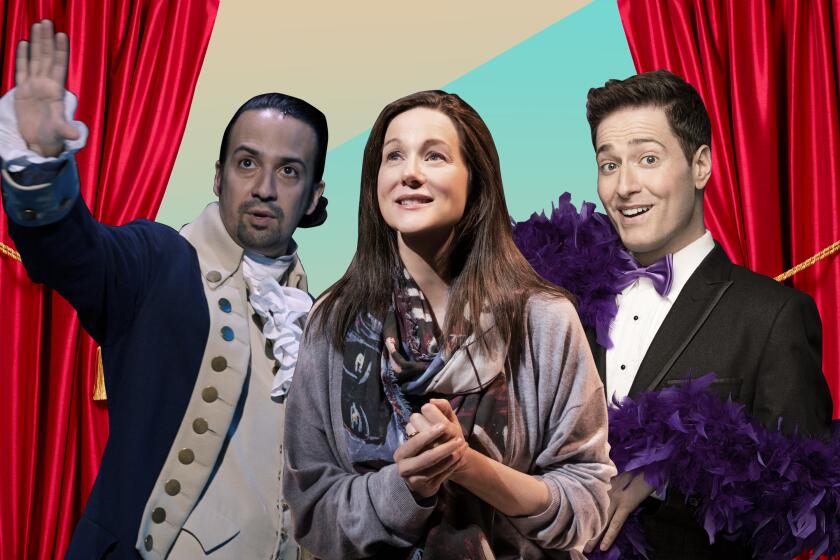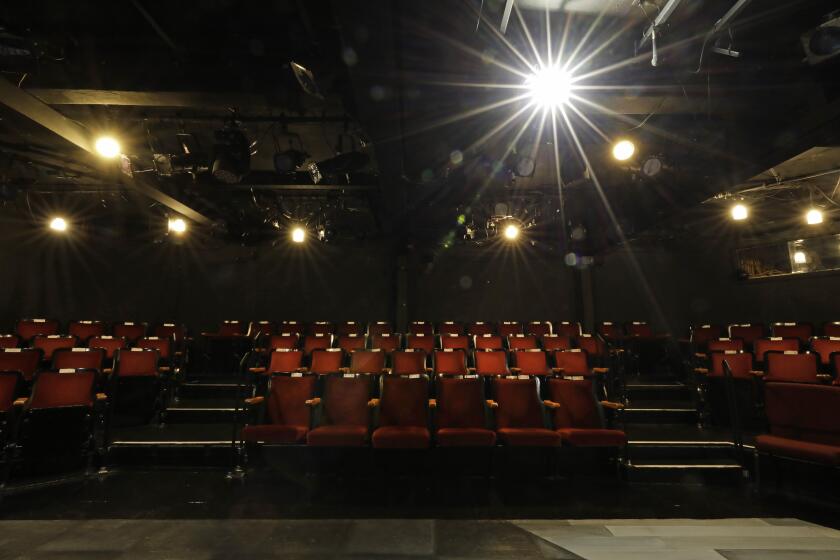My dream for theater: Toss the old business model in the dumpster fire of 2020
- Share via
No one could have predicted a year like 2020. So when asked to appear on a UCLA panel on the future of the theater, I knew to bring a sense of irony, if not humility, to Zoom.
Vaccines are being loaded onto trucks, but theatergoing isn’t likely to resume indoors before September. And even then, we’re not sure whether we’ll still be wearing masks and distancing will be required.
Old theater habits will likely take another year to restart, as confidence in the safety of public gatherings slowly returns. The economic implications of this are devastating, but could there be artistic renewal in the wreckage?
In preparing my remarks for Resituating the Comedia Roundtable: For a Theater of the Future — the first of two sessions organized by UCLA Professor Barbara Fuchs and featuring key Los Angeles theater leaders, artists and scholars — I began from the premise that a return to business as usual is not the ultimate goal.
Even before the pandemic, the theater’s economic model was broken. Our resident theaters, the nonprofit companies that constitute the art form’s national foundation, arose in a cultural landscape drastically different from today’s.
One important way in which this landscape has changed is in the marketplace for attention. Not only has our access to art and entertainment grown exponentially, but we all now enjoy the role of curator, controlling not only what we see but how and when we see it.
“West Side Story,” “Hamilton,” Laura Linney, Andrew Scott and “What the Constitution Means to Me,” the last of which gave us two reasons to applaud.
The fallout of this has been profound in the area of institutional loyalty. Theatergoers, addressed in the language of marketing, have come to see themselves as customers.
Purchasing a one-off ticket for a performance is patronage without strings, attendance without a sense of belonging. What’s missing is commitment. Theatergoing on the surface may seem like another entertainment indulgence, but at its core it’s an expression of a commitment to a community of values.
Golden Ages in the theater are not just a coincidence of lucky births, such as Aeschylus, Sophocles and Euripides or Marlowe, Shakespeare and Ben Jonson. Golden Ages happen through a circuit of audiences, artists and institutions. All three elements must be in place for the stage to flourish.
How to regain theatergoer investment after such a long hiatus is the looming question. For some it’s going to be hard enough reacclimating to traffic, school and office hours, and regular family functions, never mind driving downtown on weeknights to the Music Center. Much as I miss my outings at the Ahmanson Theatre, the thought of fighting rush hour to make an 8 p.m. curtain arouses in me some mild PTSD.
Something I’ve heard repeatedly from producers and artistic directors is that L.A. audiences are drawn to events. That if they’re going to get back in their cars and separate themselves from their smart TVs, they need almost a guarantee that they’re going to experience something special, something that could not be obtained elsewhere.
Habits that were barely habits to begin with aren’t going to automatically restart. Absence may make the heart grow fonder, but extended truancy diminishes interest. In the first phase of recovery from this protracted disruption there will be many who can’t wait to jump back into their uncomfortable theater seats. But a larger group will need extra enticement to return.
The standard appeal (another bloated Broadway touring show, celebrity vehicle No. 1,249, a heaping platter of earnestness) isn’t likely to cut it. The convention of a season of plays and musicals, presented on an administrative timeline, was already becoming a vestige of a bygone era even before the theaters closed.
In a bracingly honest essay for the New York Times on the future of the restaurant business, chef, restaurateur and writer Gabrielle Hamilton reflects on a ritual she doesn’t seem all that unhappy to see end:
And God, the brunch, the brunch. The phone hauled out for every single pancake and every single Bloody Mary to be photographed and Instagrammed. That guy who strolls in and won’t remove his sunglasses as he holds up two fingers at my hostess without saying a word: He wants a table for two. The purebred lap dogs now passed off as service animals to calm the anxieties that might arise from eating eggs Benedict on a Sunday afternoon. I want the girl who called the first day of our mandated shut down to call back, in however many months when restaurants are allowed to reopen, so I can tell her with delight and sincerity: No. We are not open for brunch. There is no more brunch.
I wish that an artistic director would announce the end of season programming, that anodyne calculus designed to appeal to a dwindling subscriber base. The older white demographic has long been the economic backbone of the American theater. But for reasons financial, cultural and democratic, the future depends on a more inclusive embrace.
Companies that don’t have a venue and therefore aren’t burdened by significant overhead may have an advantage in winning back reluctant theatergoers and in converting new ones. Work that can’t be found elsewhere, that is tailored not to the general marketplace but to specific communities, offers unique incentive.
The economic devastation of the pandemic is taking a profound toll on L.A.’s small theaters. Camaraderie, and action, are easing the pain.
In the theater of the not-so-distant future, companies that place artistic imperatives over institutional obligations will be better situated to reach new audiences. If this means fewer offerings of higher quality, I think the trade-off will be welcome. Why should the arts follow the madness of the rest of the economy in worshipping an ever-expanding GDP? The days of business plan theater are over.
The word “comedia,” evoking the glorious commingling of tragedy and comedy in the Spanish Golden Age, invited the UCLA panelists to contemplate how the world classics fit into their vision of the theatrical future. The companies that I’m most likely to seek out are those that aren’t locked into institutional timetables but that can take as long as they need to discover fresh life in Lope de Vega, Shakespeare and Lorraine Hansberry.
Assembly line revivals of Eugene O’Neill, Thornton Wilder and David Mamet hardly seem worth the effort at this point. On the other hand, productions that aren’t being shoe-horned into preexisting spaces or rushing to meet artificial deadlines or returning to the same old titles will make a stronger case to the distracted, the disinclined and the disaffected.
To retrieve those who have grown comfortable experiencing the stage on their screens, in-person performance will have to tap into the inherent power of liveness. The actor-audience relationship cannot be an afterthought. Theater practitioners must continually ask what distinguishes their art form from technological media. The question can no longer be consigned to the avant-garde.
A production that has found its purpose and rhythm will make a theater’s next invitation all the more coveted. But companies that build integrity by treating their artists as sharers in a collaborative mission rather than disposable gig workers are more likely to establish communal goodwill — something you can’t put a price on.
My vision may seem utopian, but the Foundry Theatre, which lasted 25 years in New York, and the Industry, which is still going strong in L.A., have shown that it’s possible to win support in just this way. Their independent model won’t be replicable on a wide scale in an American theater ruled by boards of directors and cartels of investors. But after such an unprecedented interruption, even traditional organizations are going to have to reconsider the rigid formats in which they produce.
There are tremendous advantages to having a theatrical venue, but flexibility isn’t one of them. André Gregory, working with an ad hoc group of artists, spent years exploring Chekhov’s “Uncle Vanya” and Ibsen’s “The Master Builder” before bringing forth his ensemble’s findings. He had a family fortune to fall back on, but how could American companies find more than three or four weeks of rehearsal for even a play as monumental as “King Lear”?
When approaching the classics, one is forced to bridge theatrical vocabularies and grammars. To flatten the repertoire of dramatic literature to accommodate a playing style of TV-friendly realism — a routine expedience in the American theater — is to render both past and present obsolete.
The meeting of contemporary and classic aesthetics demands, in addition to cultivated technical prowess, a pioneering temperament. What’s being explored is not just stagecraft but theatrical interpretation and meaning.
In grappling with plays from earlier eras, a clash of values is inevitable. For work that may not pass muster with current political morality, we need to figure out how to balance critique with appreciation.
By balance I don’t mean a canceling out but an acceptance of contradiction. Works that can seem retrograde can also be radical. The theater, built on messy dialectics, is resistant to ideology. The stage, where dogma goes to die, isn’t meant to reinforce confirmation bias.
The gender politics of Aeschylus’ “The Oresteia” may strike us as outdated. But the trilogy’s movement from retributive justice to something more democratic remains revelatory — if only we’re willing to discover what may be lurking beneath the offending surface.
To unlock the treasures inside these plays, we need flexibility of schedule, space and, perhaps most crucial, mind. The theater of the future should be a place to rethink certainties — collectively, critically and compassionately. Our assumptions about art and its place in our lives must be part of this reinvestigation.
“Resituating the Comedia Roundtable: For a Theater of the Future, Part II” will be held Jan. 15. This event is free, but you must register in advance.
More to Read
The biggest entertainment stories
Get our big stories about Hollywood, film, television, music, arts, culture and more right in your inbox as soon as they publish.
You may occasionally receive promotional content from the Los Angeles Times.













